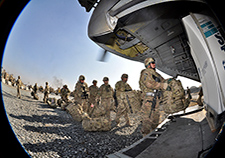Office of Research & Development |
 |

VA Research Currents archive
April 22, 2016

U.S. soldiers from the Guam Army National Guard prepare to board a CH-47 Chinook from Camp Phoenix in Kabul, Afghanistan, in 2013, before heading home. (Photo by Sgt. Eddie Siguenza)
Altruism is alive and well—at least among 89 Iraq and Afghanistan Veterans who took part in focus groups held by VA's Seattle Epidemiologic Research and Information Center (ERIC).
The ERIC, part of VA's Cooperative Studies Program, conducted 10 focus groups in five U.S. cities in late 2015 to gain insight into how to involve Veterans of this cohort in VA research. Individuals were compensated $150 to participate in the focus groups, which took about three hours, including travel time.
Most of the Veterans who took part said they wanted to benefit others, in addition to possibly finding solutions for their own health challenges.
"The findings suggested Veterans are interested in joining research to help find ways to improve their own health, as well as help their fellow service members and future generations," said project coordinator Emily Ashmore.
Most of the Veterans who took part said they wanted to benefit others, as well as possibly find solutions for their own health challenges.
The focus groups covered a wide range of topics related to research participation. The Veterans—average age 38, nearly a third of whom were women—talked about factors that would motivate them to get involved; what type of compensation they thought would be fair; and issues relating to privacy, and the interface between research and their VA benefits. (In short, there is no impact on benefits.)
The lessons gleaned from the sessions add to the ERIC's existing knowledge about recruiting and retaining Veterans in research.
"We've gained a vast amount of knowledge that could improve recruitment strategies for studies," says Ashmore. Her group aims to share that wisdom with other VA researchers through a variety of vehicles, including a webinar on April 27. (See below for more details.)
The project is part of a broader effort among VA researchers to learn more about the best ways to engage Veterans in research, and to share those lessons with other researchers. The Cooperative Studies Program Epidemiology Center in Durham, N.C., has some projects in that vein as well.
VA Health Services Research and Development convened a Veteran Engagement Workgroup in early 2015 to address the topic, and has since held two cyberseminars to share the group's recommendations and to further explore the topic.
Ashmore says such efforts across the VA research community "allow researchers to skip some of the trial and error process typically found during the beginning stages of constructing a study."
Here are more of the lessons that her team learned from the recent focus groups:
Ashmore notes that the findings may not reflect the attitudes of other cohorts of Veterans. She said her team and others in the Cooperative Studies Program are now doing similar focus groups with Veterans from the Vietnam and Gulf War eras.
The Seattle ERIC will hold a webinar on its Iraq-Afghanistan focus-group findings for the VA research community on April 27, 11 a.m. - noon PDT. Interested VA researchers and clinicians can contact Ashmore for more details at emily.ashmore@va.gov.